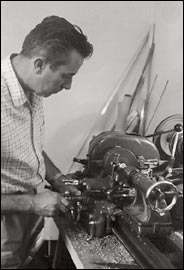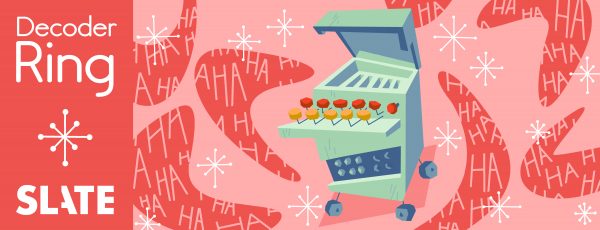What happened to the laugh track? For nearly five decades, it was ubiquitous, simulating in-person audience experiences in home living rooms. But beginning in the early 2000s, it fell out of sitcom fashion. So how did we get from Beverly Hillbillies to 30 Rock?
In this featured episode, we meet the man who created the laugh track, which originated as a homemade piece of technology, and trace that technology’s fall and the rise of a more modern idea about humor.
 Charles Douglass‘ creation, the “Audience Response Duplicator” (or: “Laff Box”), recombined recorded laughter, available on demand. This was particularly useful as live comedy gave way to videotaped shows. At first, Douglass’ approach was used sparingly, to fill in gaps when actual audiences failed to pick up on a joke as intended (they were also slowly muted if they laughed for longer than producers wanted).
Charles Douglass‘ creation, the “Audience Response Duplicator” (or: “Laff Box”), recombined recorded laughter, available on demand. This was particularly useful as live comedy gave way to videotaped shows. At first, Douglass’ approach was used sparingly, to fill in gaps when actual audiences failed to pick up on a joke as intended (they were also slowly muted if they laughed for longer than producers wanted).
The machine evolved to look somewhat like a typewriter, but with keys that let sound engineers like Douglass press buttons to make sounds. As shows were increasingly filmed without studio audiences, the box became essential, but its design remained a closely guarded secret. The individual boxes were covered up and locked down when not in use.
For years, Douglass had a virtual monopoly on the business. And for decades, many shows were essentially designed around spaces left for laughter, resulting in somewhat depressing results when it’s removed.
In recent years, the laugh track has fallen back out of favor. Some shows, like Sports Night, spanned a transitional period, starting out with a laugh track that grew softer and was eventually dropped entirely.
With the help of historians, laugh track obsessives, the showrunners of One Day at a Time and the director of Sports Night, Decoder Ring asks if the laugh track was about something bigger than laughter. Subscribe to Decoder Ring in Apple Podcasts.




Comments (16)
Share
I really enjoyed this episode. I’ve always noticed the laugh track on sit coms. When I was a kid in the 90s my mum wanted me to turn off the TV, she said “you don’t even get any of the jokes!” she was right, of course, but I couldn’t let her know that. So I started laughing along with the laugh track. She thought I was finding it hilarious, and never realised what I was doing!
While I remember Sports Night for its overall breakout qualities, I’m a little suprised that the reporting here didn’t mention the handful of M*A*S*H episodes in the 1980’s that Larry Gelbart negotiated to have no laugh track. For those who don’t know, M*A*S*H was a show about a Mobile Army Surgical Hospital during the Korean war, and ran for 8 seasons. I was a hard-core addict of M*A*S*H in my adolescent years and remember the first time they aired an episode with no laugh track – it was a big deal covered by TV-reviewers at the time. Looking around the internet briefly, I don’t see those reviews but there is a nice overview here: http://mentalfloss.com/article/56777/why-did-mash-have-laugh-track.
You refer to the UK television series “The Office” as notable for its lack of a laugh track. In fact there are many earlier examples of such “mockumentaries” on British radio and TV – e.g. “On the Hour”, “People Like Us”, and “Brass Eye” were all very popular in the 1990s. A laugh track wouldn’t fit with this the faux-documentary format.
I felt the producers omitted Scrubs as one of the early successful US shows that did not feature a laugh track. Scrubs appeared in 2001, four years before the US version of The Office and a year and a half off the heels of Sports Night.
The 2005 Scrubs Episode My Life in Four Cameras parodies the staged sitcom format and has a Laff track which is quite a contrast to their typical format.
I believe the Okeh Laughing Record mentioned in this episode was considered funny because the trumpet being interrupted was playing funeral music. That’s the joke. It’s not funny because people in the 20s just laughed at simpler things, it’s funny because the context was so serious. It’s the dark humor of its time.
I must be the most dedicated 99pi listener. I’m sure I’ve heard all of them. My top 99pi episodes are: Wild Ones Live & Sanctuary (Church and State).
Also, “Frontline” was an Australian comedy series from 1994 with no laugh track. It’s like “The Office” except a decade earlier.
Scrubs was an early show with no laugh track. It started in 2001
You should check out the Canadian show “Just for Laughs” there is no talking, people are playing gags on others and the only sound is the laugh track.
The awkwardness of the Friends clip reminds me a bit of “Garfield minus Garfield” where they erase Garfield from the comic so that Jon is just talking to himself…
http://garfieldminusgarfield.net/
And then there is “3eanuts” which is the original Peanuts and Charlie Brown gang, but only the first three frames.
http://3eanuts.com/
1) It would be interesting to know if most people watching a comedy tv show alone at home will laugh out loud at something funny vs if they are watching with someone else
2) It would be an interesting experiment to do this:
Invite 200 people to a live comedy. Instruct the first 199 people walking into the audience room to only laugh at every second funny joke. Don’t say anything to the last person arriving. Video tape the crowds reaction to the performance and see if that last person always takes cues from the group about when to laugh or not.
All in all I enjoyed this podcast, I love when documentaries like this focus on the elements of culture that are meant to remain hidden. Regardless of what people think of the laugh track, it deserves recognition for what it is and this was a great look at it. And while Sports Night may have been ahead of it’s time, I think however, that the podcast is remiss in crediting the UK The Office, Arrested Development, and the US The Office, while not mentioning Malcolm in the Middle (2000, preceding those other shows), Scrubs (2001), and My Name is Earl (2005) and how they succeeded where Sports Night could not (in attaining success with no laugh Track). Scrubs even created an episode that lampooned the sitcom laugh track formula showing the contrast between itself and the old way (My Life in Four Cameras, 2005). Scrubs went on for 9 seasons, which is to say that it attained more success than any of the aforementioned shows, with the exception of The Office (US) that also ran for 9.
The Laff Box was ultimately left in an abandoned storage container and auctioned off, where it eventually made it’s way to Antiques Roadshow: http://www.pbs.org/video/antiques-roadshow-appraisal-1953-charlie-douglass-laff-box/
The host incorrectly referred to traditional sitcoms as single camera. That traditional style (usually with a laugh track) is multi-camera.
The first sitcom episode without a laugh track was much earlier than any of the ones you talk about. When M*A*S*H started in 1972, Larry Gelbart did not want a laugh track, but the studio insisted. The compromise they reached was that there would be no laugh track in the operating room. In the third season, in 1974, the episode “The O.R.” aired. This episode was about a 24-hour operating room marathon. The entire episode was set in the O.R., so there was no laugh track for the entire episode.
This episode was very interesting, but please rethink how you use the word “lame.” It is an ableist slur, after all, and was used twice in this episode.
All the best.
The intro to this episode is too long and repetitive. Otherwise, the linear narrative is clear, informative, and interesting.